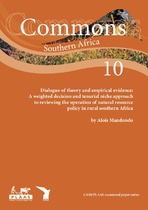Dialogue of theory and empirical evidence: A weighted decision and tenurial niche approach to reviewing the operation of natural resource policy in rural southern Africa
Abstract
Considerable research has been conducted on community-based natural resource management in rural southern Africa. Many interesting insights have accumulated from the literature on the research issues of earlier generations. The challenge is to break new ground by unraveling insights relevant to later generations. This study identifies the issue of scale in complex natural resource management systems as one of the more important among emerging issues in the sector. The study develops a theoretical framework implying trade-offs between deciding for others, deciding with others and deciding for oneself in the operation of natural resource policy. This weighted decision framework is used to critically interrogate the human ecology of land and resource use across a variety of tenurial niches in rural southern Africa. The study argues that in arriving at decisions regarding the operation of natural resource policy, the emphasis needs to shift from what should be done, to how it should be done. The study suggests that the ‘how it should be done’ of policy operation is a calibration problem. The calibration problem concerns itself with reconciling diverse preferences through the medium of decisions made for others, with others and for oneself. It is concluded that negotiation provides the most appropriate basis for calibration since it reconciles the contradictions within and among decisions made for others, with others and for oneself.

